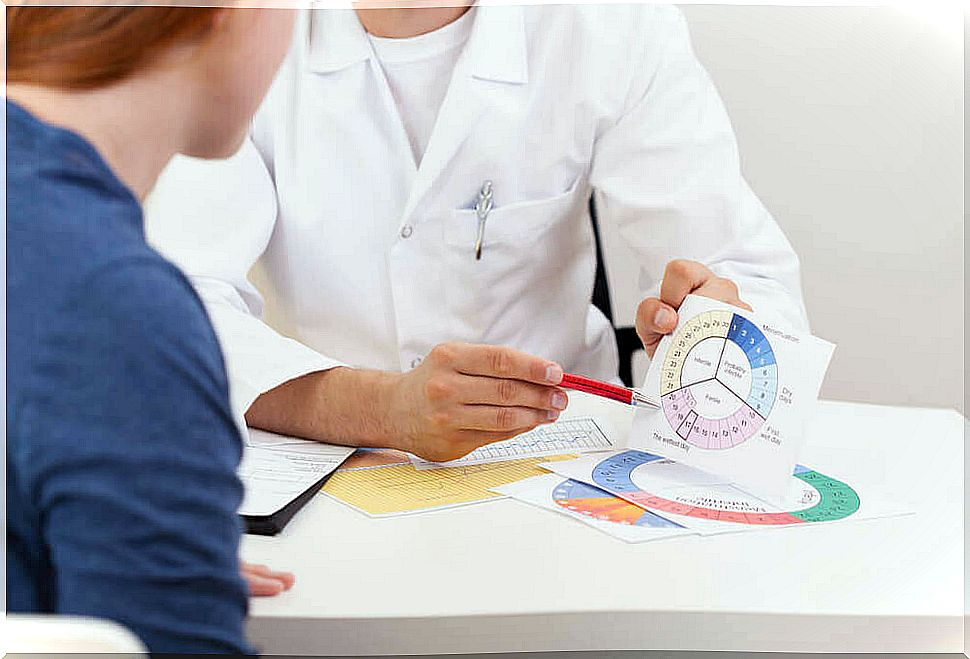Irregular Menstrual Cycles

Irregular menstrual cycles can arise as a result of a combination of both physical and emotional factors. Although not all manifest to the same degree, their presence affects our well-being. The most obvious ones are breastfeeding and the stage before menopause.
Regardless of the cause, irregular menstrual cycles are of great concern as health is considered to be at risk. While this is not always the case, it is important to pay attention to your body’s signals. Of course, it must always be the doctor who will determine a person’s state of health.
When is the menstrual cycle considered irregular?
When a menstrual cycle is less than 21 days old, it is called ‘polymenorrhea’. If it lasts beyond 35 days, it is known as ‘oligomenorrhea’. In both cases they are irregular, as in most women the normal cycles are between 21 to 35 days, with few women having cycles of 28 days.
In addition, when the period lasts more than 7 days and the amount exceeds 80 ml, it is also possible to say that there is an irregularity. In these cases, it is necessary to seek the gynecologist, who will make a complete assessment of the patient and determine, depending on what is necessary, a treatment.

When is there greater inconstancy?
After the first period, over a period of 2 years, menstrual cycles are irregular in many women. Furthermore, they also occur 3 years before menopause.
This is because, during these periods, between 6% and 34% of women experience anovulation, a hormonal imbalance that prevents the ovaries from releasing mature eggs.
Causes of Irregular Menstrual Cycles
In general, disorders of the psychosomatic type are the ones that most affect organic imbalance. Therefore, stress and anxiety are one of the main reasons for the lack of control and even the transient absence of menstruation. On the physical level, thyroid malfunction can also cause irregularities.
In other cases, irregular menstrual cycles occur due to an ovulation disorder called polycystic ovary syndrome. As the ovaries have cysts, the body’s natural balance is altered and, consequently, so does menstruation.
On the other hand, diabetes and eating disorders such as bulimia and anorexia also cause irregularities. In addition, they are also the cause of both drastic weight loss and gain in a short time.
Adolescence and irregularities
There are young women whose menstrual cycle runs like clockwork. However, there are women for whom menstruation changes date every month and sometimes it may be absent for a month.
It can also happen that women menstruate twice in the same month. It is worth noting that this is not a problem, as long as the cycle is between 21 and 35 days.
As for the number of days that menstruation lasts, it may vary each month. In general, the duration varies from just 2 days to a week. This is because the body’s hormonal concentration varies each month, which influences the duration and amount of blood.
Breastfeeding and the menstrual cycle
During breastfeeding, the menstrual cycle varies for each woman. Some go from 4 to 5 months or even 12 months without menstruation. This usually happens when breastfeeding is exclusive and there is a maximum interval of 6 hours between feedings.
Consequently, milk production inhibits the hormone responsible for the menstruation period. This should not be a cause for concern as it is part of the body’s natural process.
Signals
- Outbreak of acne.
- Mood changes.
- Headaches.
- Irritability and hypersensitivity.
- Back pain and stiffness.
- Sleep pattern irregularity.
- Inflammation of the breasts, which become swollen and hard.

Treatment
For irregular menstrual cycles, the gynecologist indicates the appropriate treatment in each particular case. Treatment usually includes contraceptives and some nutritional supplements, which help maintain hormonal balance and regulate the menstrual cycle.
Meanwhile, for irregular menstrual cycles caused by menopause and puberty, there is no medical treatment indicated unless there is an underlying disease.
Irregular menstrual cycles: some recommendations
It is necessary to get enough rest and avoid stress. A good diet positively influences the body both physically and emotionally. Also, do physical activities, such as sports and exercise, according to your ability.
Maintain proper hygiene when menstruating and take the treatment correctly, if indicated by the doctor.
Having irregular menstrual cycles can be a health problem. However, you can handle the situation by knowing your case and following specific recommendations.









